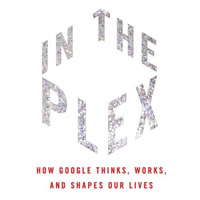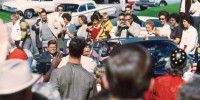Bill Gates and President Bill Clinton on the NSA, Safe Sex, and American Exceptionalism
- 11.12.13
- 6:30 AM

Bill Gates, photographed in New York City on September 23, 2013.  Nadav Kander
Nadav Kander
You want a world-class conversation about the future of global health, the vanguard of philanthropy, and the divide between ignorance and data-driven knowledge? Bring in the Bills. Gates and Clinton, that is.
They share much more than a first name. Both pivoted from spectacular first acts to second careers devoted to tackling some of the biggest problems on the planet. To do this, they have capitalized on their previous roles, their connections, and their brainpower. In Clinton’s case, it turned out that the attributes that make for the ultimate politician work equally well in the service of philanthropy.
As founder of the Bill, Hillary & Chelsea Clinton Foundation, the former president is a forceful explainer in chief, elucidating what needs to be done to alleviate poverty and treat AIDS. And to the surprise of many who followed Gates as a full-tilt techie devoted to preserving Microsoft’s dominance, he has pursued philanthropy with the same passion he once channeled into software. At the Bill & Melinda Gates Foundation, he approaches problem-solving—particularly the scientific arcana of health and agriculture—with an appreciation of scale honed by years of living under Moore’s law.
Both organizations have made a staggering impact. The Clinton Global Initiative, part of the former president’s foundation, claims to have improved the lives of more than 430 million people in 180 countries. The Bill & Melinda Gates Foundation has by some estimates saved some 6 million lives and delivered a higher-quality existence to many, many more.
The foundations are at the forefront of a new era in philanthropy, in which decisions—often referred to as investments—are made with the strategic precision demanded of business and government, then painstakingly tracked to gauge their success. The Gates Foundation shot to philanthropic heights instantly after its launch in 2000, with the world’s richest man pledging the bulk of his fortune—$28.7 billion so far—and, after 2008, the bulk of his attention. (Gates has challenged other rich industrialists to follow his altruistic lead, most notably his pal Warren Buffet.) Making use of a mind so precise and logical that it once crunched the entire Basic computer language into 4 kilobytes of memory, Gates demands metrics to show that his investments are getting results. “I have been struck again and again by how important measurement is to improving the human condition,” he wrote in this year’s annual progress report. One current priority: Gates is pursuing the world’s remaining cases of polio with the zeal of a Javert. His foundation’s activities include expanding the role of libraries as digital centers, revamping teacher evaluations, promoting genetically redesigned seeds, and devising improved condoms and toilets.
The Clinton Foundation is less a funder than a launching pad for projects benefiting the global good. It organizes its interests in nine separate tracks, encompassing achievable goals that range from improving AIDS treatment to reducing greenhouse gas emissions. These are often in sync with the United Nations’ Millennium Development Goals, benchmarks to improve conditions in eight key areas, including combatting poverty and disease. The Clinton Global Initiative encourages its deep-pocketed members to take action, requiring them to make commitments once they figure out what projects to undertake. Each commitment must be original, specific, and measurable. CGI facilitates the projects, often by tapping its extensive networks.
Gates and Clinton have long bonded over their shared mission. They have traveled together to neglected corners of the world—fodder for a buddy movie that Hollywood has so far missed. “I knew him before he was president, I knew him when he was president, and I know him now that he’s not president,” Gates remarks with a smile while waiting for his friend to arrive. He talks fondly of their forays into developing regions and cites the close partnership between their organizations. (Not mentioned: whether, on some long bus ride to a South African village, Gates asked his traveling partner about that antitrust thing that Clinton’s Justice Department waged against him.)
This interview took place on September 23 at the annual Clinton Global Initiative meeting, a kind of wonk Woodstock occurring in conjunction with the opening of the 67th session of the UN General Assembly in New York. The 42nd president was ubiquitous at his event, moderating a panel that included Bono, Sheryl Sandberg, and Christine Lagarde. Gates himself bounced between the conference and the UN, appearing on a CGI panel (“‘Big Bets’ Philanthropy”) and meeting with the leaders of Chad, Ethiopia, Pakistan, Japan, and Canada. After warmly greeting each other, the two Bills jumped into conversation, edited here for space and clarity.
Both of you are embarked on your next careers, helping to change the world. How do you decide what to focus on?
Clinton: When I left the White House, I decided to focus on things that I had cared about when I was there, where I could still make a difference. One is our Health Access Initiative, thanks largely to funding from the Gates Foundation. Building health systems is important. We’ve been able to drive down the price of AIDS and malaria drugs, and we’re now distributing millions of [antidiarrheal] oral rehydration therapy and zinc packages a year. Another is the Clinton Global Initiative, where I try to build a global network of people to do their own thing. And then we have a huge effort against childhood obesity in America. We got the soft drink and juice companies to agree to reduce by 90 percent the total calories in the drinks they ship to schools.
Gates: Melinda and I always knew we’d have the responsibility and the enjoyment of giving resources away, and so it was an exploration process, traveling throughout the world. When we saw the poorest, it became the thing to go after. It’s been exciting that the kind of work I’ve done at Microsoft—backing scientists and seeing how work can actually get delivered—is pretty similar.
You and President Clinton have traveled together. How does a famous pair like you escape the celebrity bubble to connect with the people you want to help?
Clinton: We go to a lot of places where people have no television, so we’re not all that famous. You just have to go to these places and ask questions. When Bill and I went to Africa [in 2006], Melinda was with us, and she asked better questions than we did on some of these HIV/AIDS prevention efforts.
I understand that one situation put you face-to-face with an African couple to discuss their use of a microbicide to protect the woman from getting HIV.
Gates: We were trying to understand what the experience was like for her and her partner—but neither Bill nor I were willing to ask that in a very direct way. We were sort of hinting at it. But Melinda was able to ask both the man and the woman very directly. This was in South Africa, and then we went to Lesotho. Nobody knew us there. You know, if you want to get away from that kind of [celebrity] craziness, working in Africa is great for it.
Clinton: All they knew was that we were showing up trying to help them. I was just in Malawi at one of our farm projects, and the woman that we were helping there had been farming an acre with a hoe, and she had learned new planting techniques. She looked at me and said, “You think you could do this? Well, do it, then.” And I got a hoe and we were planting together. She said, “How’d you learn to do this?” And I explained that when I was 6, I lived on a little farm like this. Helping them live their lives is much more important than who we used to be. Do you agree with that?
Gates: Sure.
Steven Levy's deep dive into Google, In The Plex: How Google Thinks, Works And Shapes Our Lives, was published in April, 2011. Steven also blogs at StevenLevy.com.
Check out Steve's Google+ Profile .
Follow @stevenlevy on Twitter.











